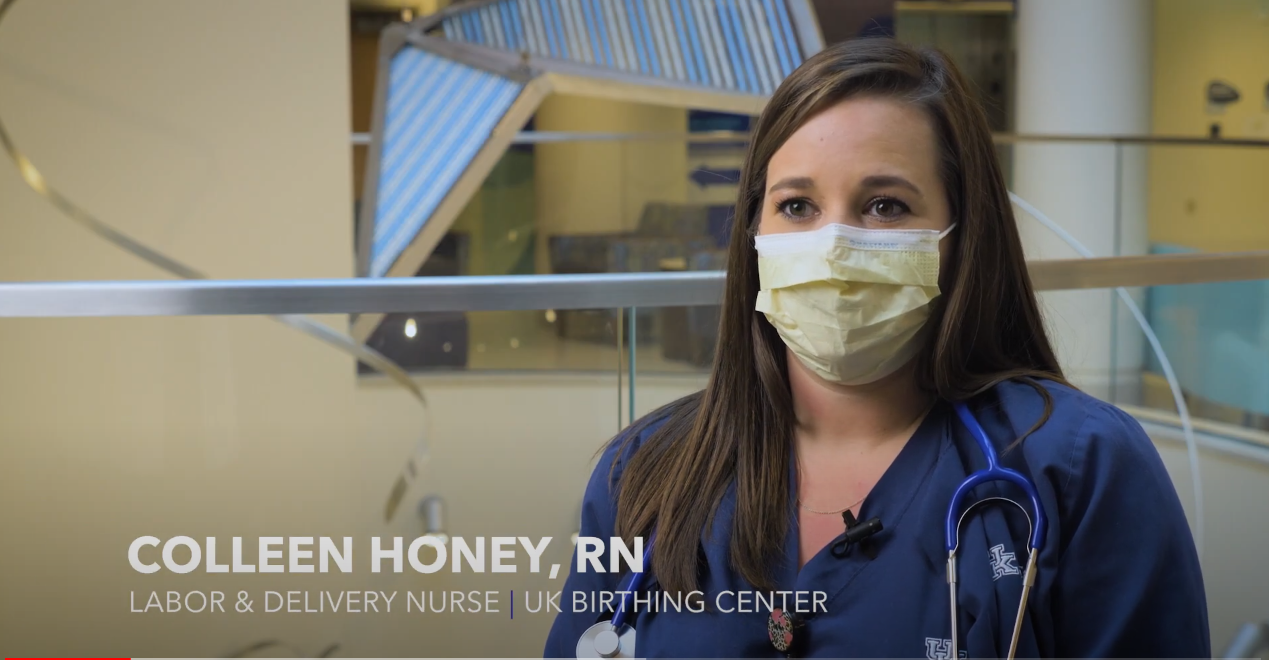Voices from the Front Lines: Colleen Honey

We recently joined hospital staff for a few days to document the reality of treating COVID-19 patients in UK HealthCare clinical settings.
This edited interview is part of our ongoing series, “UK HealthCare: Voices from the Front Lines,” highlighting stories and perspectives from our frontline staff who have been caring for the sickest COVID-19 patients since March 2020.
Colleen Honey, RN, has worked in labor and delivery at UK HealthCare for about eight years.
What was your work like before the pandemic?
UK is busy in general. We get the outlying counties, we see their sick moms. They come here, we care for them – high-risk pregnancies, deliveries, things like that. So, we were busy. And then we had our nice, normal, healthy pregnancies on top of that. And since then, COVID has changed things.
How have things changed?
Early in the pandemic, we weren't really sure how to approach it, what to do as far as making sure we're keeping ourselves safe and our moms safe, and then we didn't have negative-pressure rooms. So, we were taking everyone to our COVID unit and it's definitely evolved since then. Almost three quarters of our beds now are negative-pressure beds. And I've definitely noticed a change in how sick our patients are getting from the beginning of the pandemic to now.
How can it affect a pregnancy if the mother has to be put on a ventilator or ECMO?
That's a big deal, because a baby is being oxygenated by the mom. So, if mom isn't having a good exchange of oxygen, then baby's not having a good exchange of oxygen and ultimately it can lead to preterm deliveries. And it's pretty serious. We don't want to deliver early, but sometimes we have to, because mom's not getting enough oxygen circulating, which means the baby's not getting enough.
Pregnant women are at higher risk. The CDC announced that pregnant women are definitely at higher risk and any pregnant woman with other co-morbidities are even at higher risk. So, for them to be vaccinated, which we are encouraging, is pretty important at this point. I've gotten a lot of feedback from moms that maybe they're scared of the vaccination. They're worried about their baby's well-being. We've had studies over the last year that show that it is safe and we're really trying to encourage our moms to get the vaccine as soon as they can.
What’s something that’s been really memorable while treating COVID patients?
I would say that the real kicker here is that our goal at the end of the day is to keep our moms and our babies healthy and this variant, and COVID in general, doesn't pick and choose. You don't know who it's going to affect poorly and who's going to do well. So, the take-home to that is really, we just have to try to keep our healthy people as healthy as possible. And those who are immunocompromised, you really have to protect them and encourage them to listen to medical advice, really listen to their providers and encourage them to get the vaccine. Because I have seen several healthy, normal, young moms get very, very sick and need ECMO and need high-flow oxygen and things like that. It just doesn't pick and choose.
How is the staff doing here at the hospital?
Our staff is feeling it. I think the whole hospital is feeling it. I think we thought with the vaccine, things would get better and this is a little bit of a surprise maybe, and the morale is on the lower side. But on our floor, we're a pretty good team. I feel like we work really well together and we really try to boost each other up, really try to help each other out when the days are difficult.
What keeps you coming back to work?
I really enjoy taking care of moms and I really enjoy pediatrics, so I really enjoy babies. I always looked forward to doing that and I got to do that. And, I don't plan on switching it up anytime soon.
Those moms (giving birth), it's their biggest day. They never forget it.
What’s the main thing you’d like people outside the hospital to understand about COVID?
I would really want people to know that it's real because I feel like a lot of people think it's not so real or, ‘I got COVID and I'm not that sick,’ things like that. And like I said earlier, it doesn't pick and choose.
Who's going to get really sick and who's not? Some people have co-morbidities and maybe they don't get as sick, but some people are completely healthy and they need intubation and ECMO and things like that. So, we've really got to be diligent about keeping ourselves safe out there and being considerate of others, especially during this time.




